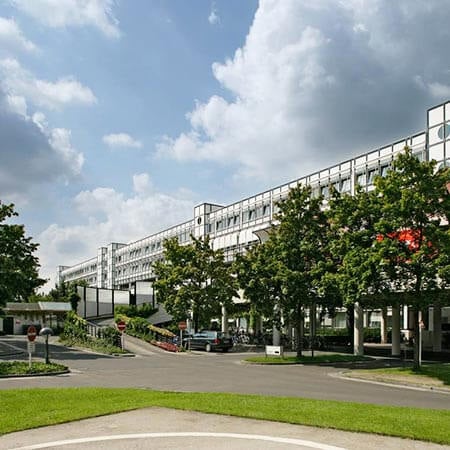Cancer of unknown primary (CUP) includes malignant neoplasms localization of which can not be established during medical examination. According to the European Society for Medical Oncology, this category of malignant neoplasms is detected in 3-5% of all oncology cases.
Content
- Cancer highlights
- Types of cancer of unknown primary
- Diagnostics in Germany
- Cancer treatment in Germany: principles
- Chemotherapy overview
- Immunotherapy
- Radiation therapy
- Is surgery an option?
- Treatment in German hospitals
- The cost of treatment in Germany
- Going to Germany for treatment of cancer of unknown primary (CUP)
Cancer highlights
In cancer of unknown primary (CUP) metastases cause symptoms earlier than the tumor does. A primary neoplasm sometimes is so small that it does not manifest itself clinically, and sometimes the tumor origin remains unknown even after medical examination methods.
In cancer of unknown primary (CUP), tumor metastases can manifest with the lymph nodes damage, damage of bones, and various organs and tissues.
Highlights of cancer of unknown primary (CUP) are:
- No signs of primary tumor (patients seek medical help related to symptoms caused by metastases)
- Early metastases formation
- Uncharacteristic spreading of metastatic process (e.g. metastases of pancreatic cancer in the bone tissue, etc.)
Types of cancer of unknown primary
These tumors are divided into adenocarcinomas, squamous cell carcinomas, poorly differentiated carcinomas, and undifferentiated neoplasms.
Neuroendocrine carcinomas are often mentioned separately because these tumors belong to a treatable subgroup as they are similar to small cell lung carcinoma and are treated accordingly. Histochemical staining, immunological tests, tests for specific genes and cellular receptors are helpful in determining the nature of tumors.
Diagnostics in Germany
Very often cancer is detected only at the stage of metastases spreading, causing prolonged symptoms that worsen with time.
After a thorough medical examination, detected neoplasms are determined to be secondary tumors, or metastases, while the primary tumor is localized elsewhere in the body. Unfortunately, determining the initial location of the tumor isn’t possible in some cases. For such cases, metastases that are present in various parts of the body are the primary indicator of a malignant process.
Luckily, German doctors can deal with this phenomenon. During medical examination of patients with cancer of unknown primary (CUP), they make efforts not only for establishing a specific diagnosis at any cost. They try to figure out which patients are in critical health condition, and which patients will benefit from existing and widely used methods of treatment, such as chemotherapy and hormone therapy.
Diagnostics includes several steps:
- First, the anamnesis is collected, which includes evaluating the medical history of oncology, as well as other pathologies of organs and tissues
- Then patients undergo physical examination, where the lymph nodes, skin, the mammary glands, prostate, rectum, female and male genitals are checked
- Thirdly, laboratory tests are conducted, commonly including biochemical blood tests, blood tests for oncomarkers and others
- The final step is instrumental diagnostics that combines ultrasound scan, X-ray imaging, MRI, and CT scan (endoscopic medical examination is possible when neoplasm is thought to be located in certain organs)
Cancer treatment in Germany: principles
At present, in German hospitals, following principles are developed for treatment of cancer of unknown primary (CUP):
- Therapy is elaborated individually, taking into account the data of preliminary examination
- Subtypes of oncology are distinguished, which are sensitive to certain treatments
- All patients receive symptomatic therapy
- After treatment completion, results of therapy are evaluated
Even when the prognosis is unfavorable, treatment regimens that prolong a patient's life or improve its quality are used. However, along with potential benefits, German doctors consider potential side effects of palliative treatment.
Medical protocol highlights that there’s no internationally approved treatment regimen for cancer of unknown primary.
When developing the treatment tactics for cancer of unknown primary (CUP), it is very important to identify the primary tumor type if possible, as based on the type of cancer, the patient receives appropriate therapy.
Cancer cells may mutate, so it is not always possible to establish where the tumor has originated from or where it’s located now. However, the treatment of cancer of unknown primary (CUP) in German hospitals is possible even under such circumstances. Treatment tactics is based on the patient's complaints, as well as on the biological characteristics of the growth of cancer cells.
Chemotherapy overview
The most widely used method of treatment of cancer of unknown primary (CUP) is chemotherapy. Chemotherapy acts systemically on the whole body, which seems like a reasonable treatment choice, since the localization of the tumor isn’t identified.
Before starting any treatment, patients undergo comprehensive diagnostics, even more so in case of cancer of unknown primary (CUP).
In regard to treatment tactics for CUP, the decisive factor is the resistance of cancer cells to chemotherapy drugs. Statistics shows that many patients have chemotherapy-resistant cancer of unknown primary.
The systemic effect of chemotherapy, that is usually related to high toxicity and side effects, provides patients with CUP with the benefits of eliminating undetected cancer cells and damaging a primary tumor.
Different types of chemotherapeutic drugs with specific targets are used in the treatment. For example, in poorly differentiated carcinoma with affection of the lymph nodes, platinum-containing chemotherapy is used. In undifferentiated neuroendocrine carcinoma, drugs containing cisplatin and etoposide are used. In adenocarcinoma with bone and liver damage, low toxic chemotherapy with a focus on symptomatic effect is used.
After several chemotherapy sessions, German doctors check how malignant cells respond to chemotherapy. Then they evaluate the potential medical benefits of therapy and its possible side effects.
Immunotherapy
Immunotherapy usually does not belong to commonly used methods of treating CUP. However, it’s effectiveness is studied currently.
Immunotherapy activates the immune system in a way that enables it to fight cancer. Immunotherapy has shown positive results in the treatment of certain types of cancer, which allows considering immunotherapy an alternative to chemotherapy in eligible patients.
Radiation therapy
In the treatment of cancer of unknown primary (CUP), radiotherapy is a more symptomatical option.
Radiation therapy is used for squamous cell carcinoma with the involvement of the lymph nodes. It is combined with induction platinum-containing chemotherapy for a more pronounced effect.
Hormone therapy
Hormone therapy involves the use of synthetic hormones that influence levels of naturally produced hormones, which a malignant neoplasm depends upon.
As for cancer of unknown primary (CUP), hormone therapy is an option if cancer is hormone-dependent.
Hormone therapy is used for adenocarcinoma with elevated PSA levels in men. The course of hormone therapy in this case is similar to the one used in the treatment of prostate cancer.
Is surgery an option?
It’s true that surgery is a first-line therapy method for most cancers. However, surgery in cancer of unknown primary can eliminate only some cancer cells. Surgical treatment can be a local treatment of CUP, if malignant cells are detected in the lymph nodes that are eligible for removal. Women with affection of the axillary nodes are treated with surgery. The lymph nodes are excised with optional mastectomy. In other cases, surgical treatment is always followed by radiotherapy or chemotherapy.
Therapy for metastatic processes, in general, less often includes surgical removal of the pathological focus, since partial resection or complete removal of an organ is rarely reasonable when the primary focus is undetected. More often, the local treatment for metastases includes the use of external gamma irradiation, and chemotherapy, supplemented by hormone therapy (if the tumor is assumed to be hormone-dependent).
Treatment in German hospitals
German hospitals have learned how to treat cancer of unknown primary (CUP), including even the most complex cases of it.
In German hospitals, the atmosphere of sincere service to the patient is created. Openness, sociability, great responsibility, and efficiency, readiness to deal with difficult cases that require thoughtfulness and hard work is impressive. And many international patients have witnessed that.
You can find out more about cancer treatment in Germany on the Booking Health website.
The cost of treatment in Germany
The highlights of the diagnosis, the number of the required medical procedures, and the pricing policy of the hospital influence the cost of treatment in Germany. However, the prices in Germany aren’t that different from prices in other European countries, but are significantly lower than in the US or the UK.
The cost of diagnosis of cancer of unknown primary (CUP) in Germany starts at 9,227 EUR.
You may undergo additional procedures that aren’t included in the initial treatment program, but are necessary for your therapy. It is important to keep in mind that the initial price might not cover the full cost of treatment. You don’t need to worry about it though. You will be informed about the full cost of treatment in due time.
To specify the overall cost of cancer treatment in Germany, leave the request on the Booking Health website.
Going to Germany for treatment of cancer of unknown primary (CUP)
Thousands of patients choose Germany to undergo their treatments. Today, cancer treatment in Germany has gained the reputation of one of the most efficient in the world. In addition to the highly qualified doctors, German medical facilities are famous for their excellent service and impeccable technological equipment, which is regularly modernized and updated. This is why there is every opportunity to treat diseases that might not be a subject for treatment within your region.
As one of the world’s best medical tourism agencies, Booking Health can make cancer treatment in Germany accessible for you. With services Booking Health provides you don’t need to worry about anything. Such services include choosing the right medical facility, negotiating with the hospital, preparing medical documents needed for travel (including a medical visa), scheduling tickets and booking accommodation.
Booking Health works with highlights of the situation and listens to your wishes. If you want to get quality treatment in Germany, contact Booking Health by filling the request form on the company’s website.
Authors:
The article was edited by medical experts, board-certified doctors Dr. Nadezhda Ivanisova and Dr. Sergey Pashchenko. For the treatment of the conditions referred to in the article, you must consult a doctor; the information in the article is not intended for self-medication!
Sources:
National Center for Biotechnology
Cancer Research Institute
American Cancer Society










